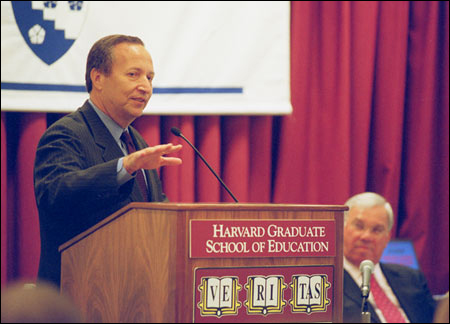Joining ‘the battle for America’s future’
Summers, Menino issue call to action at conference on after-school programs

Programs for city children before, during, and after school are the battleground for the nation’s future, and the quality of those programs will determine what kind of country we will be, Harvard University President Lawrence H. Summers said Friday (Oct. 3).
Summers joined Boston Mayor Thomas Menino at the Harvard Graduate School of Education (GSE) to open a conference on improving after-school programs. The two urged participants to not just talk about research, but to come up with an action plan.
“The battle for America’s future will be won or lost in the next century in America’s urban public schools,” Summers said. “It will be won or lost in American public schools because they are the crucible in which the young people who will comprise the largest part of our population a quarter century from now will be formed.”
Just as critical as what happens to children in school, Summers said, is what happens to them during their preschool years, during the hours after school, and during their weekend, vacation, and holiday time.
“Those are the fronts on which this battle is going to be won or is going to be lost,” Summers said. “The stakes here are very, very high.”
Quality after-school programs provide an effective complement to classroom activities, bolstering the efforts of teachers trying to educate children from diverse backgrounds and home situations, Menino said.
“After-school programs work and are vital to the success of our young people,” Menino said. “They need that reinforcement. [After-school programs] help what goes on in the classroom, it can’t just happen in five or six hours.”
Menino and Summers opened “Learning With Excitement,” a research and policy forum that attracted more than 100 researchers, policy-makers, and practitioners in after-school education. The event was designed to allow participants to both hear current research in the field and discuss that research in small groups. The day’s final session was a gathering of ideas and recommendations from the small group sessions.
Gil Noam, director of the Graduate School of Education’s Program in Afterschool Education and Research, and faculty member at McLean Hospital, Harvard Medical School, said research into after-school programs is becoming more focused and coordinated as people realize those programs’ critical role in supporting in-school efforts.
That focus, coupled with a greater institutional commitment to improve after-school education, Noam said, has created the opportunity for positive change.
“We have an incredible opportunity before us,” Noam said.
The event was not the first time Harvard and Boston have collaborated on after-school education. Under Menino’s leadership, Harvard and the city have joined forces in a partnership designed to improve learning after school gets out.
Called the Harvard After School Initiative (HASI), the collaboration supports the Boston After School for All Partnership, directing $5 million in University funds and leveraging human resources to deliver technical assistance from University researchers and experts in the field, to strengthen after-school programming in several city neighborhoods.
The conference was sponsored by the Graduate School of Education’s Program in Afterschool Education and Research. HASI and Robert and Marjie Kargman funded the event.
Key to efforts to improve after-school programs is the ability to evaluate them, Summers said. He offered a critical comparison of efforts to determine what works and what doesn’t in the education and medical fields.
“If we had the same commitment or lack of commitment to evaluation in medicine that we have traditionally had in many spheres of education, we’d still be leeching people to make them better,” Summers said. “It is madness to spend tens of billions of dollars in literally hundreds, if not thousands, of different school districts in different ways without devising methodologies that rigorously evaluate what works and what does not work – and growing what works and shrinking what does not.”
Summers said evaluations in education have traditionally been geared to measure success in areas easy to measure, such as math achievement, but not in more difficult but equally important areas such as a child’s preparation for success in the world outside school.
“The failure to evaluate what works and the allowance of children to continue year after year after year in programs that we don’t know whether they do work or do not work,” Summers said, “is leaving our children behind in every bit as real a way as leaving them in classrooms that are not fully painted or not providing them with modern textbooks.”
Read President Summers’ remarks: ‘Learning with Excitement’ Conference
Read Mayor Menino’s remarks: ‘Learning with Excitement’ Conference




